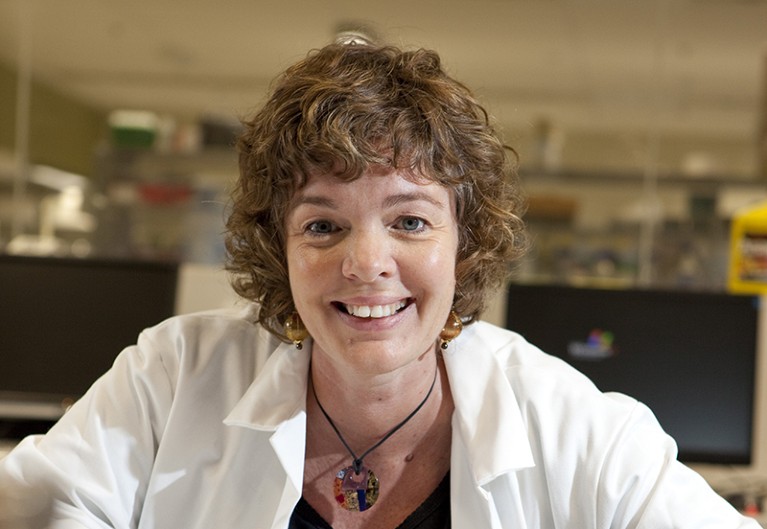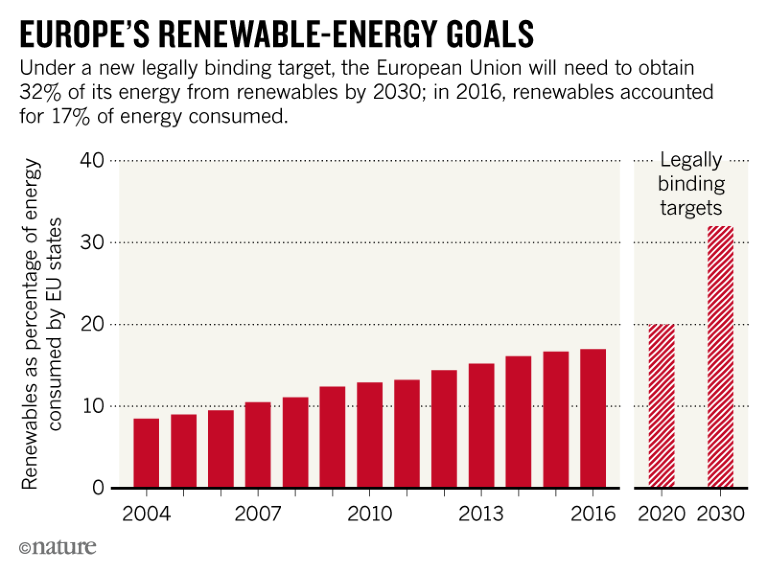EVENTS
Mars dust endangers NASA rover A huge dust storm is blanketing much of Mars, blocking the sunlight that NASA’s 15-year-old Opportunity rover needs to survive. Mission controllers have not heard from the solar-powered rover since 10 June, and think it is in a low-power mode in which everything except its clock is turned off. If the rover’s power level and temperature don’t drop too low — and predictions suggest they won’t — then it might be able to wake itself once the dust has cleared. That could take weeks. Opportunity landed on Mars in January 2004, and was designed to last 90 Martian days, or about 13 Earth weeks.

NASA’s Opportunity rover has been caught in a massive dust storm on Mars. Credit: NASA/JPL-Caltech/Cornell/Arizona State Univ.
Water shortage India is experiencing the worst water crisis in its history, according to a government study. The report, released on 14 June, examined water supplies in 24 of the country’s 36 states and union territories and found that nearly 70% of fresh water is contaminated. The report also found that groundwater resources — which account for 40% of the country’s freshwater supply — are being depleted at unsustainable rates. By 2020, 21 major cities are expected to run out of groundwater. Poor rainwater-storage infrastructure is contributing to the crisis. The government agency in charge of water in New Delhi says the city loses 40% of its drinking water from leaking pipes and unauthorized connections. A 2016 report by non-profit group WaterAid found that an estimated 76 million people in India have no access to safe drinking water.
RESEARCH
Study cancelled On 15 June, the US National Institutes of Health (NIH) terminated a controversial US$100-million study into whether drinking small amounts of alcohol every day can improve health. The agency’s decision came shortly after an NIH advisory council voted unanimously to end the trial, dubbed MACH15. An NIH investigation had found that agency staff and outside researchers had acted inappropriately by soliciting industry funding and biasing the grant-review process. “We are deeply disappointed that issues raised have led to a recommendation to end the trial,” said lead investigator and cardiovascular researcher Kenneth Mukamal of Beth Israel Deaconess Medical Center in Boston, Massachusetts, in a statement. “We strongly believe that MACH15 has a critically important scientific premise, rigorous design, and highly-qualified team,” he says.
Harassment study Sexual harassment is pervasive throughout academic science in the United States, driving talented researchers out of the field and harming others’ careers, finds a report from the US National Academies of Sciences, Engineering, and Medicine in Washington DC. The analysis concludes that policies to fight the problem are ineffective because they are set up to protect institutions, not victims — and that universities, funding agencies, scientific societies and other organizations must take stronger action. The report, released on 12 June, is the most comprehensive study yet on the extent of harassment in the sciences.
Diet debacle The New England Journal of Medicine retracted a landmark nutritional study of the Mediterranean diet and published a corrected article on 13 June. The study, which evaluated the diets of 7,447 participants for a median of 4.8 years, is one of six that the journal has corrected in the wake of a 2017 analysis that flagged possible statistical abnormalities (J. B. Carlisle Anaesthesia 72, 944–952; 2017). Despite the revisions, the corrected version of the Mediterranean diet study still concluded that supplementing the diet with extra-virgin olive oil or nuts can make it beneficial for those at high risk of heart disease (R. Estruch et al. N. Engl. J. Med. http://doi.org/cq2s; 2018).
TECHNOLOGY
DeepMind ethics Health-technology firm DeepMind Health has agreed to abide by 12 ethics principles proposed by an independent panel that regularly reviews its work. The London company is owned by Google’s parent firm Alphabet, and is developing tools that use artificial intelligence (AI) to improve health services. The principles, published on 15 June, include making sure that the patients whose data are used to create the company’s algorithms benefit from them, and that the firm does not become a monopoly or make “excessive profits”. The panel’s annual review report adds that DeepMind Health should specify and publicly disclose how it proposes to make money in the future. This month, Google also unveiled broader rules governing its AI usage.
AI ethics code The Singapore government will develop a voluntary code of ethics for businesses that use artificial intelligence (AI) and personal data. The code will focus on ensuring that AI use in industry is transparent and fair. The country will appoint an advisory council, with members from both the public and private sectors, to oversee the plan. A five-year research programme at the Singapore Management University will also examine the ethical, legal, policy and governance issues arising from AI and data use. The city-state joins countries such as India and the United Kingdom in exploring ethical AI use.
PEOPLE
Science adviser The New Zealand government appointed biochemist Juliet Gerrard as its next chief scientific adviser on 12 June. Gerrard (pictured) will be the second person and first woman to occupy the post, which advises the prime minister on science and science-policy issues. She is a faculty member at the University of Auckland whose research focuses on how the structure and assembly of a protein influence its function. Gerrard said she hopes her appointment will encourage young female scientists to be ambitious in their careers. She will take over from Peter Gluckman — who was appointed in 2008 — on 1 July.

Juliet Gerrard has been appointed New Zealand’s new chief scientific adviser. Credit: Univ. Canterbury
Fraud charges On 14 June, Elizabeth Holmes and Ramesh Balwani, respectively the former chief executive and former president of health-technology company Theranos in Palo Alto, California, were each charged with conspiracy to commit wire fraud and with wire fraud. According to the indictment from the US attorney’s office in San Jose, California, Holmes and Balwani used electronic communications to mislead physicians, patients and investors with false claims about the accuracy and reliability of the company’s fast and cheap blood analyser, and about Theranos’s financial condition. Balwani’s lawyer, Jeffrey Coopersmith, said in a statement that his client is “innocent, and looks forward to clearing his name at trial”. Theranos declined to comment on the case but announced that Holmes was no longer chief executive, although she remains chair of the board. Holmes did not respond to a request for comment.
POLICY
Delayed rule The US Department of Health and Human Services (HHS) has delayed implementing reforms to the ‘Common Rule’, which governs research involving human subjects. On 18 June, the HHS said that institutions had until 21 January 2019 to comply with the latest version of the Common Rule, which aims to streamline regulatory safeguards such as ethics approval boards and consent forms for storing biological samples. It is the second delay for the revised regulation, which was initially scheduled to take effect in January 2018. Universities and medical-research institutions had lobbied for more time to institute the changes and clarify the rule’s requirements.
FACILITIES
Particle collider Work on a major upgrade to the world’s most powerful particle collider began on 15 June. The Large Hadron Collider at CERN, Europe’s particle-physics lab near Geneva, Switzerland, began smashing together protons in its 27-kilometre-long accelerator ring a decade ago, to test fundamental physics theories and hunt for new particles. It can currently collide about 1 billion protons per second. Once the work is complete in 2026, the upgraded ‘high luminosity’ machine will use more-powerful magnets to generate up to 7 times as many collisions and collect 10 times as much data. Finer data will allow physicists to make more-accurate measurements and to see the influence of as-yet-undiscovered phenomena.
PUBLISHING
US open-access deal A US university has signed an agreement with an academic publisher to offset the costs of open-access publishing against journal subscriptions. The deal between the Massachusetts Institute of Technology in Cambridge and the Royal Society of Chemistry, a British scholarly publisher, is the first of its type in North America, according to a statement released by the university on 14 June. Some proponents of the contracts, known as read-and-publish agreements, say they are an important step towards removing paywalls on some publicly funded research articles. Several consortia that negotiate publishing agreements on behalf of universities in European countries have agreed read-and-publish deals in recent years.
FUNDING
EU science cash European universities are demanding more money for basic research under Horizon Europe, the European Union’s next major research programme, which will run from 2021 to 2027. EU policymakers outlined a proposed structure for the programme’s provisional €100-billion (US$116-billion) budget on 7 June. Fourteen pan-European higher-education organizations issued a joint response to the proposal on 15 June, calling the total budget to be increased to €160 billion and for a review of the distribution of funds between innovation and fundamental-research elements. They want more more money for proven programmes such as the European Research Council, the prestigious basic-science funder which has a proposed budget of €16.6 billion for the 7-year scheme. They also say universities must be given a greater role in the largely untested European Innovation Council, which has a provisional budget of €10 billion.
TREND WATCH
European Union policymakers reached a deal on 14 June to strengthen the bloc’s legally binding targets for renewable energy. By 2030, 32% of energy consumed in the EU should be from renewable sources such as wind and solar, up from the previous goal of 27%. An interim target, to obtain 20% of energy from clean sources by 2020, remains in place. The deal includes phasing out the use of palm oil — widely blamed for contributing to deforestation — as a transport fuel by 2030.

Source: Eurostat






